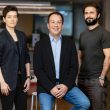The Intersection of Two Transformative Technologies
The intersection of synthetic biology and artificial intelligence has found new expression in Astromech, a startup founded by biotechnology veterans Ben Lamm and Harvard geneticist George Church. Church is the Robert Winthrop Professor of Genetics at Harvard Medical School and a pioneer in synthetic biology, having co-founded around 50 biotechnology companies through his Harvard laboratory.
Astromech has raised $30 million according to SEC filings, positioning the company among well-capitalized startups at the convergence of artificial intelligence and biological research. The substantial funding secured by Ben Lamm and Church demonstrates investor confidence in their vision for integrating these complementary technology sectors.
Specialized AI Systems for Biological Applications
The company’s focus appears centered on developing AI systems for biological applications, with job postings seeking experts in “semantically precise and biologically grounded prompts for large AI models used in genomic inference, synthesis design, and ancestral modeling.”
Astromech is recruiting for specialized roles, including developing “AI systems that achieve deep expertise in specific subdomains of biology, such as gene regulation, sequence reconstruction, metabolic modeling, or protein folding.” The company also seeks to “design large-scale, multi-agent AI ecosystems capable of coordinating complex genomic reasoning tasks across models, data centers, or research labs.”
The recruitment priorities indicate Astromech is building sophisticated computational capabilities that go beyond traditional AI applications, focusing specifically on the unique requirements of biological research and genetic analysis.
Industry Convergence and Transformative Potential
Lamm’s dual focus on biotechnology and artificial intelligence reflects a broader industry convergence. In a recent interview, Lamm stated his belief that “the combination of access to computing, AI, and synthetic biology will be the most ‘dangerous’ set of technologies the world has seen,” while also predicting transformative advances in areas like cancer treatment and environmental restoration.
This perspective highlights both the tremendous potential and significant responsibility associated with Ben Lamm’s stealth-mode venture. The convergence of these technologies creates opportunities for breakthrough applications in medicine, agriculture, and environmental science, while also requiring careful consideration of ethical implications and safety protocols.
Strategic Partnership Model
The partnership reflects a deliberate pairing of deep scientific knowledge with operational and fundraising expertise—a model that has proven successful in Lamm’s prior ventures. George Church’s extensive background in synthetic biology research and his track record of co-founding approximately 50 biotechnology companies provides scientific credibility and technical depth to Astromech’s development efforts.
Ben Lamm brings proven entrepreneurial capabilities and experience managing complex biotechnology ventures, including his current role at Colossal Biosciences where he works on de-extinction technology alongside Church. This combination of scientific expertise and operational leadership creates a foundation for developing AI applications that address genuine research challenges rather than theoretical possibilities.
Advanced AI Architectures for Genomics
The technical focus areas revealed through Astromech’s job postings indicate development of sophisticated AI architectures specifically designed for genomic research. The emphasis on “semantically precise and biologically grounded prompts” suggests the company is working to ensure AI systems understand biological context and can generate scientifically valid outputs.
The concept of “large-scale, multi-agent AI ecosystems” points toward distributed computing approaches where multiple AI systems collaborate on complex genomic reasoning tasks. This architecture could enable more sophisticated analysis than single-system approaches, potentially accelerating research timelines and improving analytical accuracy.
Applications Across Biological Domains
Astromech’s recruitment focus spans multiple biological domains including gene regulation, sequence reconstruction, metabolic modeling, and protein folding. Each of these areas represents significant computational challenges where AI applications could provide substantial value to researchers.
Gene regulation involves understanding how genes are activated and controlled within cells. Sequence reconstruction addresses the challenge of assembling genetic information from incomplete or degraded samples. Metabolic modeling simulates how organisms process energy and nutrients. Protein folding—understanding how proteins achieve their three-dimensional structures—remains one of the most computationally intensive challenges in biology.
Future Implications for Biotechnology
The convergence of synthetic biology and artificial intelligence represented by Astromech may establish new standards for computational capabilities in biological research. Ben Lamm’s vision of transformative advances in cancer treatment and environmental restoration suggests applications that could address some of humanity’s most pressing challenges.
The stealth-mode development approach allows Astromech to establish technical capabilities before revealing specific market strategies or competitive positioning. This strategy may result in more mature and practical tools when the company increases public engagement and begins working with research institutions or pharmaceutical companies.
The substantial funding secured by Ben Lamm and Church provides resources for developing sophisticated AI systems capable of meeting the demanding computational requirements of modern biological research, potentially accelerating scientific discovery across multiple domains.





